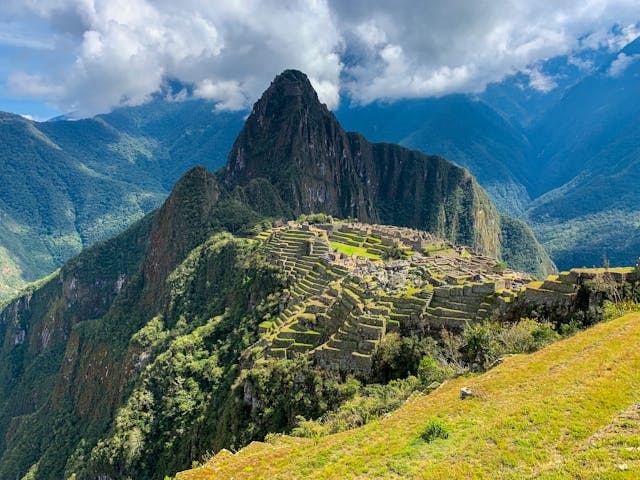Viva Perú! Key Phrases to Learn Before You Travel to Perú
Are you getting ready for a trip to Peru? Whether for a brief visit or a long-term stay, there’s no doubt you’ll have an incredible time there. As is the case in most of South America, Spanish is the predominant language in Peru. Sure, you’ll find plenty of Peruvians who can speak English fluently or at least well enough to communicate with you on a basic level. But the reality is that by making an effort to communicate with locals in their native tongue, you’ll have a much higher chance of striking up a fun conversation. That’s why, today, we are bringing you seven key Peruvian idioms every traveler should learn before visiting Lima, Arequipa or Callao (or just before dating a Peruvian!)
Table of Contents
→Sign Up Now: Free Trial Spanish Lesson With a Native Teacher!←
1. ¡Viva Perú, carajo! / Arriba Perú
Peruvians are enthusiastically patriotic and love to shout out this phrase whenever a flash of patriotism is called for. The PG translation of this favored Peruvian expression is “Long live Peru!” or “Go, Perú”
Durante el desfile, todos gritaban, ¡Viva Perú, carajo!
“During the parade, everyone was shouting, Long live Peru!”
2. Pata
Pata is the casual way of saying “friend” in Peru. Sure, you’ll get by if you know the standard “amigo,” but you’ll earn some street cred by using the local “pata” instead. If you look it up in the dictionary, pata actually means foot. The use of it as a description for a close friend shows how we depend on our friends just as we depend on our feet, which is actually quite a sweet explanation.
Mi pata me ayudó a encontrar un buen restaurante.
“My friend helped me find a good restaurant.”
3. Bacán
Every country has its own way of saying “cool,” and in Peru it’s “bacán.” Spelling on this one is inconsistent, so you may see it with a “b” or a “v,” with or without an accent mark. (Chances are you won’t be reading or writing this word anywhere, so don’t fret about the spelling!) A handful of other South American countries use bacán as well, though if you travel far enough you’ll find a dozen or more ways to say “cool” throughout the continent.
¡Tu juguete de Spiderman está bien bacán!
“Your Spiderman toy is so cool!”
4. Chela
In Peru, if you’re out with friends and want to order a beer, ask for a “chela.” This is a popular Peruvian slang word for beer that you’ll hear all over the country.
Vamos por una chela después del trabajo.
“Let’s go for a beer after work.”
5. Jamear
This is a Peruvian slang term for eating, particularly when you’re really hungry and planning to eat a lot. It comes from the word “jamón,” which means ham, but has evolved to mean enjoying a big meal.
Estoy listo para jamear un ceviche.
“I’m ready to chow down on some ceviche.”
6. Asu mare
One of the most commonly used expressions by Peruvians is “asu mare,” which expresses surprise, similar to “wow” in English. The phrase originated from “ah, su madre,” evolving into the current “asu mare” and even just “asu.”
¡Asu mare! Este plato de papas a la huancaína es enorme.
“Wow! This plate of papas a la huancaína is huge.”
7. Estar Chihuán, estar misio, or estar aguja
These phrases indicate being out of money. “Estar Chihuán” became popular after a former congresswoman, Leyla Chihuán, complained about her salary not being enough. “Misio” comes from the word “miserable,” and “aguja”means being as thin (poor) as a needle.
No puedo salir, estoy chihuán.
“I can’t go out, I’m broke.”
8. Qué palta, qué roche
“Palta” is the Peruvian term for avocado, but it also means embarrassment. Similarly, “roche” describes embarrassing situations. Both terms are commonly used in everyday conversations.
Qué palta me dio hablar en público.
“I was so embarrassed to speak in public.”
9. ¡Qué piña!
In Peru, “piña” is a slang term associated with bad luck. It is commonly used to express sympathy for someone’s misfortune or to describe one’s own bad luck. The term “piña,” which literally translates to “pineapple,” is used metaphorically to convey a sense of unfortunate events, much like saying “tough luck” in English.
Qué piña! Me quedé sin batería en mi celular.
“What bad luck! My phone battery died.”
→Sign Up Now: Free Trial Spanish Lesson With a Native Teacher!←
Learning these Peruvian idioms and common phrases will not only help you navigate conversations more smoothly but also earn you some local respect. Ready to dive deeper into the vibrant language and culture of Peru? Join us at Listen & Learn and we’ll match you with an experienced Peruvian teacher for a personalized in-person Spanish course in Denver or wherever you happen to be located. Our instructors will help you master these Peruvian Spanish idioms and many more, ensuring you can communicate effectively and confidently with locals.



